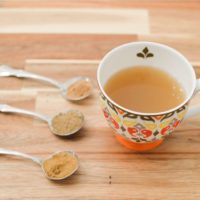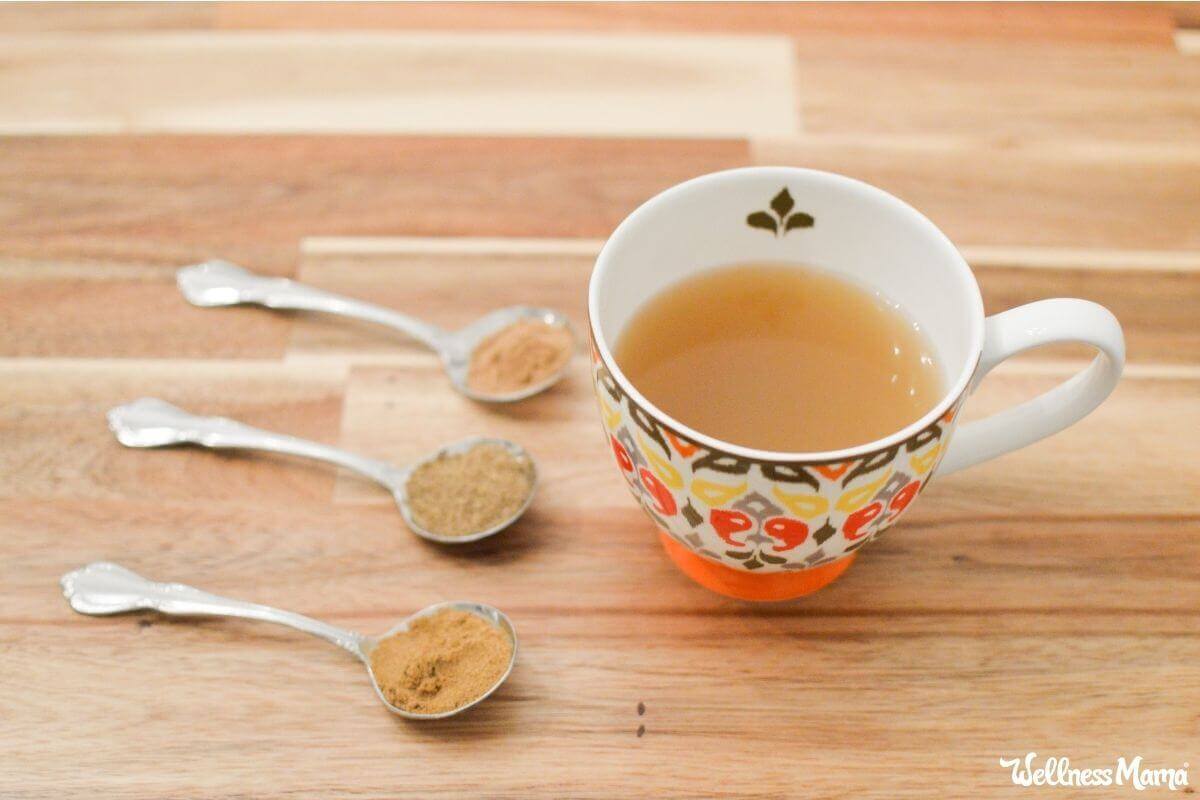After a surgery my husband had years ago (with resulting secondary infection and IV antibiotic use), his gut needed a little extra help. A gut rehabilitation he was following at the time (see below) suggested he try making a cumin coriander fennel tea to help his bloating and digestive problems.
It worked! Now we are big fans of this ancient Ayurvedic remedy.
Also called CCF Tea (for obvious reasons), we use this recipe any time one of us has nausea, constipation, or an upset stomach, or just needs a comforting nightcap.
Why to Try Cumin Coriander and Fennel Tea
The taste of this tea is a little unusual as you might imagine (in fact, we jokingly call it “Taco Tea”) but it turns out that this three-seed tea has a host of benefits.
In combination, these potent spices have a unique soothing ability and even though I wasn’t on the protocol, I found this blend relaxing as an evening tea or as a mid-morning drink for mental clarity. During post-partum it also seemed to increase my milk supply and calm my baby’s stomach as well.
(Note that this would not be the best choice for anyone on an autoimmune paleo type diet as it does contain seeds, but those who can consume spices and seeds can enjoy this tea).
Here’s why these spices are so beneficial:
Cumin
Cumin has a long history with documented use in ancient Greece and Rome, as well as in biblical times. In fact, evidence of the use of cumin as a remedy was even found in the tombs of ancient Egypt and in writings from ancient India.
Now modern studies show the ancients knew what they were doing when it came to cumin. Studies show it can help:
- improve digestion
- balance blood sugar
- reduce respiratory issues
- lower “bad” cholesterol
- serve as a source of iron and manganese
- increase pancreas enzymes
Cumin is also the source of black cumin seed oil, which also has a long history of medicinal use in various cultures.
Some people notice skin benefits from using cumin as well. I even use it in this DIY antioxidant face scrub recipe.
Coriander
Coriander is the seed of the cilantro plant. It also has a long history of use in Asia and Mediterranean countries for thousands of years. Evidence of its use was found in ancient Sanskrit text and in ancient Egypt.
In cooking, it is often part of curry blends and is used to flavor gin and certain other alcohols.
It has been used as a digestive remedy throughout history and is also documented as being used as a relaxing spice to calm an anxious mind. It is also sometimes used in tinctures and remedies for respiratory problems, urinary issues, and nervous system disorders.
Fennel
Another spice with a history of ancient use by the Chinese, Indian, Egyptian, Roman, and Greek cultures as a carminative (remedy for bloating and gas) and expectorant (respiratory remedy).
It is often given to nursing mothers to improve milk supply and because its soothing properties seem to help calm a colicky baby through the milk as well.
It is found in recipes in many cultures, especially in Italy and France.
Read more about the benefits of fennel (+ recipes) here.
Wait… What About Weight Loss?!
You’ll love this podcast all about the metabolism-boosting benefits of drinking your spices. It’s the perfect comforting replacement for snacking at night.
Benefits of Cumin Coriander and Fennel Tea
Some of the benefits often associated with this tea are:
- Improved Digestion– All of the spices used in this recipe are associated with better digestion and are carminative (meaning they reduce bloating and gas).
- Possible Fat Loss– This tea may help improve fat loss according to some preliminary studies.
- Increased Milk Production in Nursing Moms– I noticed this effect, which makes sense because fennel and cumin are often recommended to help increase milk supply.
- Soothing for Colicky Babies-Another effect I noticed personally as this tea seemed to have a soothing effect not only on my own digestion but on babies too.
How to Make CCF Tea (Cumin Coriander and Fennel Tea)
Unlike some herbal remedies (homemade cough drops… I’m looking at you), this remedy couldn’t be easier to make with a few basic supplies and some cumin, fennel, and coriander seeds.
I’ll warn you that the taste is a little bit unusual, especially if your main method of tea consumption tends to be of the sweet tea variety. I love its warming quality though and find it very calming and soothing (and I think you will too!).
Also, Christa (founder of The Whole Journey … find her on my podcast here) recommends adding some lemon or lime and some raw honey to help the flavor.
You can also pour the tea over ice to make an iced version that is a little more enjoyable (though I found the hot variety more soothing).
I’m no expert in Ayurveda so I’m not sure there are any additional health benefits, but I noticed a great taste benefit from adding a pinch of cinnamon or a few slices of fresh ginger root to the brewed tea.
Using CCF Spices in Other Recipes
On their own, these spices are some of my favorites to use in cooking, so I always have them around the house. You can use these spices for:

Cumin Coriander and Fennel Tea for Digestion
Servings
Ingredients
- ½ tsp whole dried fennel seeds
- ½ tsp whole dried coriander seeds
- ¼-½ tsp whole dried cumin seeds (to taste- using the smaller amount provides less of the cumin flavor that many people have trouble with)
- 3 cups water
Instructions
- Optional prep step: For the best flavor, I like to roast the seeds on a baking sheet at 350 for about 5-8 minutes until fragrant and golden. This is optional but I find it really improves the flavor.
- Grind the seeds- place the fennel, coriander and cumin seeds in a coffee grinder or use a mortar and pestle to create a fine powder.
- Place this powder and the water in a small saucepan and bring to a boil. Simmer for 5 minutes until fragrant and remove from heat. Add cinnamon or ginger if using and stir. Let cool to warm before adding raw honey (if using). Note: some sources recommend letting the spices soak in the water for up to an hour before simmering, though I haven’t noticed any extra benefit when I’ve done this personally.
- Strain through a fine mesh metal strainer and drink immediately or pour over ice for a cool drink. Can also be made in big batches, cooled and kept in the refrigerator until ready to consume.
Notes
Here is a video of Christa showing how to make this tea:
Warnings:
I would not personally drink fennel tea during pregnancy without checking with a doctor or midwife, as there is some anecdotal evidence that fennel may cause uterine contractions. Of course, it is important to check with a doctor before using this or any other natural remedy, especially for those with any existing health condition.
This article was medically reviewed by Madiha Saeed, MD, a board certified family physician. As always, this is not personal medical advice and we recommend that you talk with your doctor.
Ever tried this? Can’t imagine adding taco seasoning to your tea? Weigh in below!




Leave a Reply